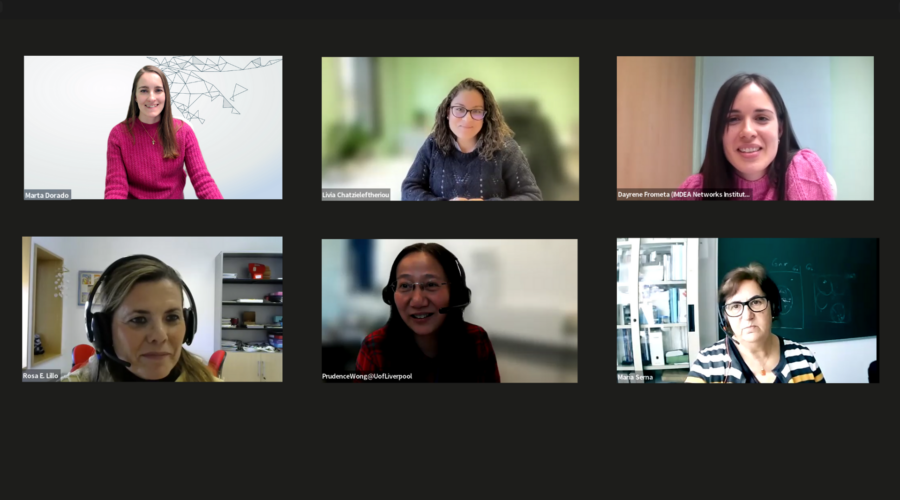IMDEA Networks

‘Conversación con investigadoras: cómo abrirse camino en la ciencia’: experiencias de mujeres científicas en primera persona
La mesa redonda organizada por IMDEA Networks supone un encuentro con el presente de la igualdad de género en la investigación tecnológica y científica
08 Febrero 2023

Hoy miércoles 8 de febrero IMDEA Networks ha celebrado una de las jornadas organizadas con motivo del Día Internacional de la Niña y la Mujer en la Ciencia (11 de febrero). ‘Conversación con investigadoras: cómo abrirse camino en la ciencia’ supuso un encuentro, moderado por Marta Dorado, Responsable de Comunicación de IMDEA Networks, con Livia Elena Chatzieleftheriou (Investigadora Postdoc en IMDEA Networks y UC3M), Dayrene Frómeta (Estudiante de doctorado en IMDEA Networks y UC3M), Prudence Wong (Catedrática de Informática en la Universidad de Liverpool), Rosa E. Lillo (Directora de IBiDat – Instituto Big Data UC3M-Santander) y María Serna (Catedrática de Informática en UPC).
Los ejemplos de las participantes, en distintas fases del recorrido de la investigación y la ciencia, supuso un ‘retrato robot’ de la situación actual, un contexto en el que las carreras de STEM muestran un reducido porcentaje de mujeres, como recordó Marta Dorado al mencionar estudios como ‘Científicas en cifras’ (Ministerio de Ciencia e Innovación), en el que señala cómo el porcentaje general de 56% de mujeres que cursan estudios universitarios desciende a un 25% en el caso de las disciplinas STEM. Datos a los que se añadieron los propios de la Unión Europea, que indican cómo solo una cuarta parte de los estudios de doctorado corresponden a mujeres.
“¿Cómo y cuándo surgió tu vocación?” fue la primera cuestión a abordar. En el caso de Livia(que recomienza iniciativas como ‘Technovation girls’), recordó cómo contó con el decidido apoyo familiar en su interés familiar, en un entorno con predominio de hombres (“por ejemplo, casi no tenía primas, solo primos. Siempre me animaron a hacer cosas que hacían mis primos varones, así que desde muy pronto vi que podía ser igual de buena que ellos en esas actividades”), mientras que Dayrene evocó la inspiración de su abuelo (ingeniero de telecomunicaciones y electrónica): “Me llamaba la atención saber qué era eso a lo que dedicaba tantas horas en su pequeño laboratorio en su casa”.
Prudence destacó, por su parte, cómo comenzó su interés en los estudios preuniversitarios (“era tan complicado entrar en ese tipo de estudios que fue lo que me motivó, y nadie me dijo qué podía o no podía hacer”). En los casos de Rosa y María, subrayaron la importancia de contar con muy buenos profesores de Matemáticas, el origen de un excepcional trayectoria en sus respectivos campos de actuación. Si Rosa destacó “la belleza de las Matemáticas”, María hizo lo propio con la importancia de aplicar de combinar la reflexión con la creatividad a la hora de enfrentarse a los problemas.
Si bien todas manifestaron ser afortunadas en sus trayectorias y no haber contado con grandes obstáculos por cuestión de género, si coincidieron en la relevancia del factor social, de la costumbre, incluso en cuestiones como las aún existentes diferencias salariales y, por ejemplo, en consideraciones como que el término ‘Ingeniería’ parece más propio de hombres. Como señaló Livia, “a veces he sentido que mis compañeros masculinos no me han tomado en serio o el ambiente no ha sido del todo amable por decirlo de alguna manera, pero al final creo que no es una cuestión solo de los hombres científicos, sino de la propia sociedad”.
Prudence, por su parte, compartió una experiencia concreta que le ocurrió con un Postdoc que contrató para entrar su equipo y que no escuchaba sus argumentos porque no le gustaba trabajar con mujeres. “Para ser sincera, no lo reporté, porque estaba al comienzo de su carrera…quizá si hubiera sido al revés hubiera cambiado la cosa, pero a raíz de esa experiencia trato de recordarme a mí misma lo importante que es señalar que este tipo de actitudes no son correctas para concienciar de que es un problema y que el resto de personas de tu alrededor puedan entender que no es el modo adecuado de pensar”.
Rosa incidió en el hándicap de hacer compatible la vida profesional con la personal, sobre todo en una primera etapa de investigación en la que hay que trabajar en muchas publicaciones: “El sistema aún no está preparado para que seas madre”, aunque, destacó cómo su universidad ha adoptado en los últimos años medidas como la reducción a la mitad del horario durante los dos primeros años de maternidad.
Dayrene coincidió, por su parte, en que las brechas en la igualdad de género no son privativas del ámbito científico, sino de la sociedad en general, a la vez que destaca la formación en igualdad de género, como sucede en instituciones como IMDEA Networks. Iniciativas como esta facilitarán el trabajo de todas las personas que, como indicó Prudence “se favorece más en instituciones como en las que trabajamos que en la industria”.
Rosa y María destacaron iniciativas como ‘Viernes STEM’, ‘Gymkana La Ciencia de los Datos’ (Programa STEM 4 GIRLS UC3M) o ‘FetXdonaTIC’, además de precisar que las cuotas de género son necesarias de cara a compensar desequilibrios, pero sin excesos. Y en todo caso, las participantes coincidieron en la importancia de que las instituciones públicas continúen con su apoyo a la igualdad de género (como destacó María, “es por ejemplo, importante, que las mujeres participen por igual en la elaboración del software para una selección de personal, hay que tener en cuenta ambas sensibilidades”).


Comentarios recientes